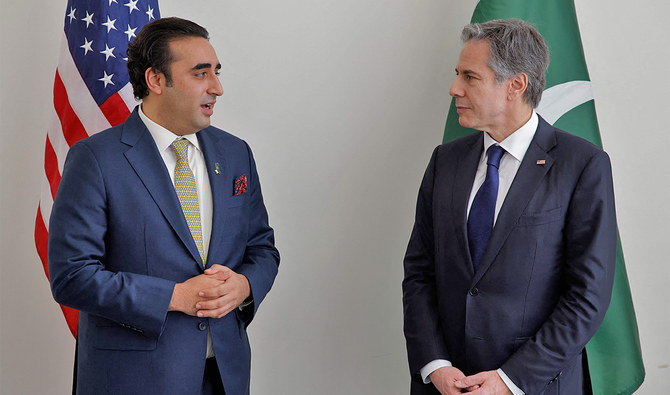ISLAMABAD: One day after Pakistani foreign minister Bilawal Bhutto-Zardari concluded his tour of the United States (US), foreign policy experts said on Friday the two-day visit could help reinforce the importance of Islamabad-Washington ties and work toward salvaging relations that were “demoted” during the tenure of former prime minister Imran Khan.
Friction seemingly began between Pakistan and the US after President Joe Biden assumed office in January 2021. Then PM Khan’s government repeatedly complained thereafter that the new US president had not contacted the Pakistani PM.
In June last year, Khan said the US had asked Pakistan if it could use its military bases for counterterrorism operations in Afghanistan after international forces pulled out of the war-torn country in August 2021. According to Khan, he had refused though American officials have variously denied the US made such a request.
In recent months, Khan has also accused Washington of working with his political opponents in Pakistan to orchestrate his ouster through a no-confidence motion. The US has repeatedly denied the accusation. Khan was voted out of power by parliament last month in the no-trust motion.
“The foreign minister’s visit came at the right time and direct contact with US Secretary [Anthony] Blinken is a welcome change as official contacts had been demoted to a much lower level during the last government,” Simbal Khan, a foreign affairs analyst, told Arab News. “He presented Pakistan’s policy positions on different issues effectively.”

Secretary of State Antony Blinken meets with Pakistani Foreign Minister Bhutto Zardari at United Nations headquarters, in New York, US, on May 18, 2022. (AP)
Simbal said the visit was “very important” in view of the wider economic meltdown, which relates to the freezing of the $6 billion International Monetary Fund (IMF) loan program.
Bhutto-Zardari returned home on Thursday after a two-day official visit to attend a global food security conference at the United Nations (UN) headquarters in New York. He met with UN Secretary-General Antonio Guterres and participated in the ministerial meeting on global food security and a Security Council debate on the maintenance of international peace and security.
The Pakistani foreign minister also met with his US counterpart Blinken and expressed the new Pakistani government’s desire to increase cooperation between the two countries. He assured Blinken Islamabad would facilitate American investors and create opportunities for them to do business in Pakistan.
Experts and analysts have termed Bhutto-Zardari’s US visit a “timely” initiative, which could mend ties that were badly strained during the tenure of former PM Khan.
Dr. Salma Malik, an assistant professor at the Defense and Strategic Studies department of Islamabad’s Quaid-i-Azam University, said the timing of the visit showed the new government wanted to quickly establish itself through global outreach.
“It is an attempt to salvage relations and undo the environment surrounding Pakistan-US relations,” she told Arab News. “We have to wait and see in which direction it goes in the coming weeks as no concrete or massive results came out of the visit immediately.”
Former foreign secretary, Aizaz Ahmed Chaudhry, who has served as Pakistan’s ambassador to the US in the last, said Bhutto-Zardari’s visit would help reinforce the importance of Pakistan-US relations.
“The foreign minister’s visit to the US was timely, good and helped him clarify many matters and reinforce the importance of bilateral relations for both countries,” Chaudhry told Arab News.
He said the US was a “preeminent part” of the world and every Pakistani government had tried to have good relations with Washington as Islamabad didn’t believe in a “zero-sum game.”
He, however, said the latest visit should not be seen as Pakistan “moving away from China and Russia,” both adversaries of the US.
China is a long-time Pakistan ally and Islamabad has moved in recent years to improve ties with Moscow.
Former Pakistani diplomat Naghmana Hashmi said the visit would help put Pak-US ties “back on track.”
“The Pakistani foreign minister has reassured not only Americans but other people as well that we are sensible people,” she said, “and we can conduct our policies like all countries, keeping our national interests in view.”
Commenting on Bhutto-Zardari’s US visit and his meeting with Blinken, close Khan aide and former human rights minister Shireen Mazari called the trip “humiliating” and once again alluded to Washington’s so-called regime change attempt:
“FM BBZ so subservient & nervous,” she wrote on Twitter. “Making matters worse, Blinken pats his arm as one does to an obedient junior! Final insult was BBZ smiling obediently as Blinken throws in condemnation of Russia. All part of US regime change conspiracy!”
















